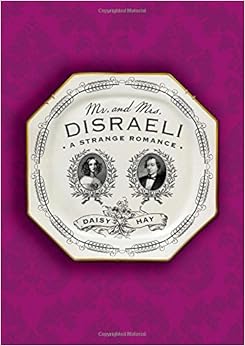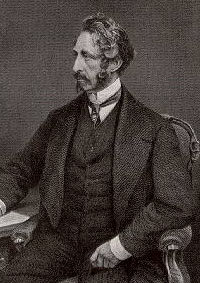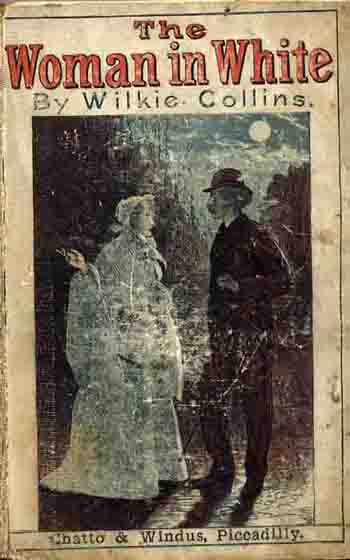As the author frequently informs us, this was no romantic marriage, but one of mutual convenience. Disraeli -- Dizzy -- was fabulously in debt, desperate to be returned to parliament in order to be immune from arrest by his multitude of creditors. He was as professionally frustrated as both author and politician as he was in Society as a Jewish outlier, despite his conversion to the Church of England. It had long been the case that a successful political career was nearly impossible for dissenters and non-conformists. Without belonging to the CoE, many other professions were also closed -- until 1907, one couldn't even get a degree from Oxford without allegiance to the Anglican Church.
The woman Disraeli married in 1839 was 12 years older than he, burdened with a semi-scandalous reputation that was founded in fact as well as gossip. His own reputation included not so sotto voce observations regarding his relationships with other men, including fellow author and member of parliament, Bulwer Lytton.
| Mary Ann Viney-Evans, 1st Viscountess Beaconsfield (1792-1872) was a petite, vivacious, good-natured and very pretty young woman. |
 |
| In her maturity Mary Ann was a beautiful woman, and remained so for many years. |
Less romantic than that is difficult to claim. But -- they enjoyed each other's company. Initially.
What followed marriage was not smooth, particularly as Disraeli constantly lied to her about the extent of his debts. She constantly had to retrench her finances, sell off her possessions, negotiate and borrow, to pull him from the fires of bankruptcy and arrest in the periods that he wasn't in parliament. On her side the big bumps were her excessive public expression, dressing excessively and as time went on, in a manner not appropriate to a woman of her age, and. most of all, her objections to 'sharing' him with friends, colleagues and his family.
We are interested in the lives of these two people and their relationship with each other, because they are significant political figures, and, as well, signature figures in their development of their era's social and literary conditions -- and how things changed from when they were young, to full-blown Victorian middle-class ideals. Benjamin Disraeli was one of the foremost politicians of the Victorian era. He was prime minister twice -- indeed, Queen Victoria's favorite minister, a condition founded upon his devotion to his wife, and hers to him. Queen Victoria even elevated Mary Ann in her own right to the peerage.
"On November 24, 1868, Mary Ann ceased to be Mrs. Disraeli and became instead Viscountess Beaconsfield."Which elevation turned out to be extremely popular with the public, to everyone's surprise.
Most English majors and most historians who deal at all with the 19th century have a sense of whom Benjamin Disraeli was, which includes his colorful early life as a dandy and aspiring literary man in the vogue of the Romantics such as Byron and Shelley. Even now, lit majors, specializing in the history of the novel, and historians specializing in the politics of the Victorian era, still read his fiction for insights into politics, religion and cultural matters of the age.
However, knowledge of his wife among both English professors and historians is less common. That Mary Ann was extraordinary -- or at least socially singular and eccentric -- is beautifully described by Hays. The author successfully makes her case, that without Mary Ann, who is judged as inferior in intellect, breeding, education and importance, Disraeli would never have risen to the pinnacles of social and political success that he did.
Most English majors and most historians who deal at all with the 19th century have a sense of whom Benjamin Disraeli was, including his colorful early life as a dandy and aspiring literary man in the vogue of the Romantics such as Byron and Shelley. Even now, lit majors, specializing in the history of the novel, and historians specializing in the politics of the Victorian era, still read his fiction for insights into politics, religions and cultural matters of the age.
However, knowledge of his wife among both English professors and historians is less common. That Mary Ann was extraordinary -- or at least socially singular and eccentric -- is beautifully described by Hays. The author successfully makes her case, that without Mary Ann, who is judged as inferior in intellect, breeding, education and importance, Disraeli would never have risen to the pinnacles of social and political success that he did.
 |
| Disraeli in his dandy period. |
As in The Woman in White, Rosina was released from that asylum by the actions of her loyal, loving female friends. In Collins's novel it is the devotion of the half-sister, who rides to the rescue, behaving as a man. (Unwomanly behavior is one of Rosina's great sins, as far as Bulwer and his friends were concerned -- meaning she was vocal about objecting to his infidelities and other bad treatment, rather than meekly accepting everything.) The Woman in White is remarkably woman-centric and woman positive for the day, centering women's actions for rescuing themselves from the legal and social constraints of the time.
Mary Ann was often laughed at for not being demure enough, for flouting the conventions of behavior, speech and dress for the increasingly rigidly ordered drawing rooms and parlors of the Victorian era. Hay frequently employs examples such as Rosina Lytton out of the circles of Mary Ann's friends and relatives to illustrate how fortunate Mary Ann's own circumstances turned out.
Mary Ann's intelligence understood how differently, financially and socially, her life was from so many of the women she knew. She understood that luck, not virtue, played a huge role in who survived prosperously, and who did not. She was generous to many of the women she knew for whom poverty and struggle were their daily condition.
Beyond this however, for anyone who is interested in Victorian England and how it became Victorian, the lives of these people, spent together, traverse that trajectory, from the Regency era, when married people were allowed, with proper decorum, wives as much as husbands, to have lovers -- to the purely domestic ideal of the angel in the house.
Politics, history and manners among this privileged set of people at the top of their society, are extremely well detailed. Wherever possible Hay has provided substantial extracts from the Disraeli's personal letters, journals and from newspaper accounts, which are valuable time-traveling devices in themselves.
Personally, considering what a role in politics they both played, I would loved to have seen some mention of their attitudes about slavery and the U.S. Civil War, but alas, there is none.
Still, as far as romance goes, Benjamin Disraeli did marry again, someone significantly younger, also wealthy.





No comments:
Post a Comment